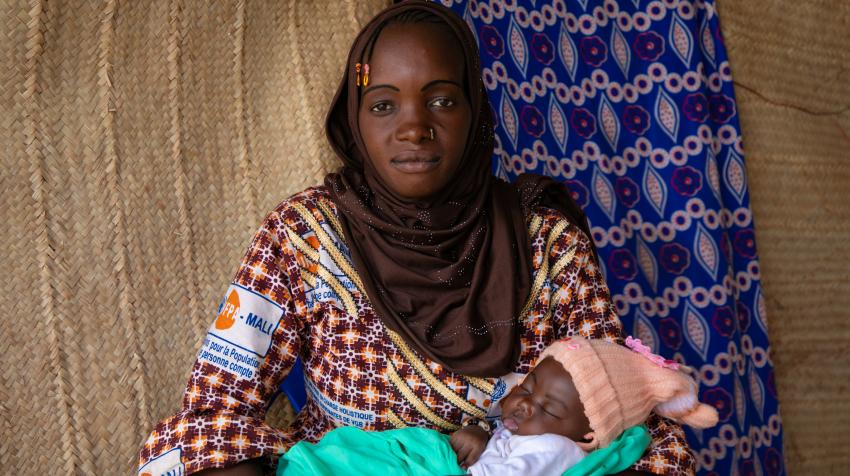From No. 2, Vol. XLVIII, “Pursuing Peace: Commemorating Dag Hammarskjöld”, 2011
In November 2008, former President Olusegun Obasanjo of Nigeria, searching for ways to ease a catastrophic crisis in the eastern region of the Democratic Republic of the Congo (DRC), came under intense criticism for calling the Congolese general, Laurent Nkunda, "my brother." Nkunda was accused by the DRC Government of war crimes and was under investigation by the International Criminal Court in The Hague. At the time, I led the Great Lakes Team in the Department of Peacekeeping Operations in New York and was responsible for oversight of the United Nations Mission in the Democratic Republic of the Congo (MONUC), and the United Nations Integrated Office in Burundi (BINUB). Nkunda occupied much of my thoughts.
Some months before, in late August, clashes between Nkunda's troops -- the rebel Congrès National pour la Défense du Peuple (CNDP) -- and the national army -- the Forces Armées de la République Démocratique du Congo (FARDC) -- had rendered moot a ceasefire which had been in place since the signing on 23 January 2008 of a peace agreement between the DRC Government, Nkunda's movement, and armed groups in both North and South Kivu provinces. The renewal of hostilities also reopened a long-festering regional sore: Nkunda claimed that his forces were protecting the minority Tutsi population in the Kivus from the Forces Démocratiques de Libération du Rwanda, or FDLR, the rebel movement which had evolved from the Interahamwe Hutu militia that fled to the DRC in 1994 after orchestrating the genocide in Rwanda that claimed the lives of approximately 800,000 people, the majority of them Tutsis.
Despite Nkunda's rhetoric about protection, his CNDP forces swept through, seizing wide swathes of fertile and mineral-rich land. Units from the FARDC (itself a cocktail army made up of both trained soldiers and undisciplined elements of former rebel groups which had signed various accords) collapsed in the face of a more robust and better organized CNDP. Within two months, the fighting had wreaked havoc on hundreds of thousands of civilian lives in North Kivu. Rapes were committed by all sides, with CNDP forces taking the lead in killing civilians and leaving terrorized populations in their wake.
Although Nkunda declared a unilateral ceasefire on 29 October, the fragility of the situation and the fact that MONUC was woefully overstretched meant that by then everything was on the table: from a request from Secretary-General Ban Ki-moon to the Security Council to authorize an additional 3,000 troops and police to help deter fighting; to a request to the European Union to deploy an interim military force to North Kivu; to sending a high-level Special Envoy to the region to broker a long term and sustainable peace agreement. There was fear in many quarters that an escalation of the conflict might begin which could bring in other actors in the region.
When the CNDP threatened to march into Goma, the provincial capital of North Kivu, the need to find a high-level negotiator who could bring Nkunda on board became urgent. It was essential to identify someone who would have the respect of the DRC authorities as well as of other regional ¬governments, and one to whom Nkunda would have a hard time showing disrespect. It was into this scenario that President Obasanjo entered, after being named by the Secretary-General as his Special Envoy for the Great Lakes. President Obasanjo travelled the region seeking the commitment of various presidents to help defuse growing tensions. It was, however, his meeting with Nkunda that subjected him to criticism. The image of President Obasanjo and Nkunda as they walked along, looking like long-lost friends, did not sit well with many of the Congolese; some addressed a signed petition to Secretary-General Ban demanding that Obasanjo be replaced. Many Congolese felt that the ethical thing for the international community to do was to marginalize Nkunda, not to engage him. More salt was poured into the wound when President Obasanjo appeared to review the CNDP troops. Critics felt that this was an honour to be reserved for armies, and not for what they considered a murderous militia, and that it gave Nkunda a kind of legitimacy which he did not deserve.
Obasanjo's strategy was to engage Nkunda on terms that Nkunda would be open to. This strategy placed him in the role of a wise big brother, with solid credentials: Obasanjo had cut his teeth in the DRC in October 1960, as a young soldier in the first UN peacekeeping mission there, when Dag Hammarsjkjöld was Secretary-General. He had risen to become a general in Africa's most populous country, had been head of state twice, and was an old hand at the game of politics, war, and diplomacy.
By this time, over 250,000 people were displaced by the clashes in North Kivu, and the civilian death-toll was high. Obasanjo could discuss these issues, strongly criticizing Nkunda for creating a humanitarian disaster while insisting on substantive terms around which agreement needed to be reached -- principally, the maintenance of the ceasefire, seeking a comprehensive peace in the region, addressing the root causes of the conflict, and ensuring humanitarian access. Yet, by also engaging with Nkunda as one soldier to another, by appealing to his professional pride as a general, and by reminding him of his role as a Congolese leader, he was able to motivate Nkunda to cooperate. Ultimately, President Obasanjo's negotiations helped lead to the opening of humanitarian corridors to reach the vulnerable, an improvement in regional relations, a dialogue between the CNDP and the DRC Government, and a process of integrating the CNDP into the FARDC, which, admittedly, has not been without serious challenges. To Obasanjo, however, it was not the image but the substance that mattered; this was a small price to pay if the objective was peace. "Ceasefire maintenance is like dancing tango," Obasanjo said. "One does not dance tango alone."
Negotiations with rebels to save lives is a complex, difficult, yet delicate tango in which I participated more than once in the DRC during the final days of a bloody period often referred to as "Africa's World War," when eight nations battled on that country's soil. I went to the DRC in 2002 and found a country completely Balkanized, with a Government in Kinshasa controlling the West, and various rebel groups staking out their territories in the East. About half the country was under the control of the Rassemblement Congolais pour la Democratie-Goma (RCD-G). Fierce battles were raging in North and South Kivu and Ituri. These cost thousands of civilians their lives; many more were injured; and over 2.7 million people were displaced -- a number that would steadily increase to over 3.4 million. Only UN international staff could travel from eastern to western DRC without significant red tape, and without raising serious suspicions. MONUC at the time was a much smaller enterprise, with approximately 4,300 troops, military observers, and police. I was hired by the then Special Representative of the Secretary-General (SRSG), Mr. Namanga Ngongi, to head a struggling Humanitarian Affairs Section in the Mission.
Facilitating humanitarian assistance was part of MONUC's mandate; however, its Humanitarian Affairs Section needed to interpret "facilitation" more broadly than it had before, and it had to include in that interpretation the protection of civilians, in order for the Mission to succeed. Three elements were part of this: 1 meeting basic essential needs of the vulnerable by supporting humanitarian actors more concretely in their work and expanding their ability to reach target populations;
2 ensuring the safety of civilians from violence by having time-sensitive, actionable information and being prepared to act upon it;
3 undertaking negotiations, wherever necessary, to achieve both these aims.
Initial resistance and fear that MONUC's humanitarian officers would end up duplicating the work of other humanitarian actors quickly dissipated. The needs were so extreme and the capacities in that vast country, so limited in comparison to those needs, that it was only through maximizing all resources, including those of MONUC, that we could hope to address the problems more effectively. I requested greater logistical support to local and international non-governmental organizations (NGOs) and UN agencies, including the transport of personnel and goods. Such support was critical in a Balkanized DRC -- the scene of one of the worst humanitarian crises in the world, and where, paradoxically, humanitarian aid was diminishing. MONUC had the capacity to provide, at zero or limited cost, life-altering assistance which could stretch the resources of our partners, allowing them to better assist suffering populations.
A transformed Humanitarian Affairs Section was needed to go beyond logistical support and monitoring and reporting. I proposed utilizing quick impact projects for humanitarian aims, setting up communication and security networks with NGO/UN partners, negotiating humanitarian access, persuading our military colleagues to protect UN/NGOs/MONUC assessment missions and humanitarian convoys where requested, and improving civil/military coordination and exchange of information. We were also asking the military to intervene in more situations, respond more rapidly when civilians were at risk, and increase efforts to physically support our UN and NGO partners when they were in danger. Although success was not always certain, the feedback we received from some of MONUC's harshest critics, particularly local NGOs and Congolese civil society, was generally positive. We were fortunate in having both an SRSG and a Deputy SRSG, Lena Sundh, who championed the humanitarian mission, and understood that contributing to improved conditions for humanitarian workers and, consequently, for those whom they served, was important.
It was in this context that, in December 2002, SRSG Ngongi led a mission to Bunia, the capital of Ituri in northeastern DRC, with the Country Director of the World Food Programme (WFP), the head of the Office for the Coordination of Humanitarian Affairs (OCHA) DRC office, the European Commission, and me. We had gone to negotiate on a number of life-saving issues. The warlord Thomas Lubanga (currently facing trial in The Hague, having been indicted by the International Criminal Court) was refusing to allow WFP -- the biggest and perhaps most crucial player in the area -- to bring in food for over 500,000 displaced persons unless the agency used a freight company linked to him and his Hema ethnic group. The stalemate had resulted in Lubanga's rebel movement, the Union des Patriotes Congolaise (UPC), embargoing all humanitarian flights coming into Bunia. Some places had not been reached with assistance in over three months. In addition, OCHA's very dynamic representative in Bunia had been declared persona non grata and was being expelled from Bunia after trying to negotiate the release of a Belgian doctor of the NGO Medair. The UPC had falsely accused Medair of trying to poison the population, spreading the incendiary rumour that expired disinfectants which Medair had in their stocks were actually expired medicines. Humanitarian workers felt extremely vulnerable -- not without reason, given the fact that they were constantly being threatened. Eighteen months earlier, six International Committee of the Red Cross workers had been murdered in a town on the outskirts of Bunia.
After the SRSG spoke, each of my colleagues made their case to Lubanga about the issues we were there to discuss. Lubanga, flanked by his military Chief of Staff Bosco Ntaganda and others, listened, though he was at times belligerent and disrespectful. As the SRSG's humanitarian chief, whenever I accompanied him or his deputy on a mission such as this, I sometimes spoke last, after I had heard a rebel leader's responses to what we had put before him. This day was no different. I said to Lubanga that I also was from a war-torn country, Liberia, and had seen war destroy lives, including the deaths of many in my own family. I told him it might seem that Bunia and Ituri were so far away no one noticed what was happening there, but that this was not true, and the eyes of the world were upon him, and people were noticing what was happening and were shocked. I asked Lubanga what he had wanted to be when he was a child, and he told me he had wished to be a priest. I said that history would recall what happened in Bunia, what he did, and I asked this man, who had dreams of being a priest, how he wished to be remembered. When we were all done with our interventions, he gave assurances to the SRSG and the negotiating team that the NGOs and UN partners would be allowed to carry out their work in safety and security in UPC controlled territory.
Although Lubanga ended up delivering on only some of his promises and only for a period of time, my colleague, a seasoned negotiator and the former head of OCHA in the DRC, noted that my words to Lubanga changed the posture in the room and created an opening for negotiation. While I don't recall whether I referred to Lubanga as "my brother," I may well have done so; I did later with other rebel leaders, including the powerful RCD-Goma leader Adolphe Onusumba, while successfully negotiating with him to grant humanitarian access and the release of some child soldiers.
Not all negotiations were with rebel leaders. I recall how the Bishop of Butembo, fearful that the city was about to be attacked, began to make incendiary remarks in his church and on the radio about MONUC, which resulted in several attacks against our staff, including the stoning of our vehicles. My boss, DSRSG Lena Sundh, made it clear to the Bishop that his statements put our staff at risk and undermined our work. She also assured him that MONUC would not stand idly by and watch Butembo fall. I reminded the Bishop that he was one of the main proponents of having MONUC personnel deployed to Butembo. Pointing at the police and civilian colleagues from Bangladesh and the United States in the room, I asked the Bishop if he was prepared to allow these people to be hurt or even killed because of his incitement to violence. I reminded him that MONUC had many committed people who had left their lives and families in distant lands and travelled to the DRC to support its people. MONUC also numbered many Congolese among its staff. The Bishop, shortly after our visit, put out new messages which immediately tempered the anger of the population and allowed our staff to once again work without fear. Ms. Sundh's presence in the area reduced the tensions, and the anticipated attack on Butembo never materialized.
In the business of negotiating, whether for access or for peace, there are generally moments when everything changes and light peaks over a bleak horizon. President Obasanjo, in his dealings with Laurent Nkunda, understood that breaking the ice can be a turning point in negotiation. What I realized in the DRC was that every rebel wanted someone to regard him with respect and to understand his aspirations, however misguided or demented. Breakthroughs were often possible, even if only for a limited period, when one succeeded in touching that part of the warlord that wanted to be judged kindly by history. A negotiator's ability to appeal to those parts in a rebel will often determine if lives are saved or not.
As for unorthodoxies, perhaps one of the most successful and catalytic moments surrounding peace negotiations in recent times occurred in July 2003 when a group of committed women from my own country, Liberia, deeply frustrated by the country's devastating civil war, were attending peace talks in Ghana between two rebel groups and the government of warlord Charles Taylor. When the women learned that the parties were planning to leave the hotel where the talks were being held without reaching an agreement, they conducted a sit-in, looping arms and virtually barricading the hotel. When security was called to remove the women, they refused to leave, threatening to strip naked until an agreement was reached. The former Nigerian Head of State, who moderated the peace talks, reacted strongly when one of the rebels threatened to strike the women for obstructing his departure, telling him, "Go back in there and sit down. If you were a real man, you wouldn't be killing your people." His tactic worked. Agreement was reached relatively quickly and, less than three weeks later, a peace accord was finally signed. These women and their courageous and unorthodox actions are largely credited with this development. Not content to rest there, following the signing of the peace accord, these same inspirational women mobilized their sisters in Liberia to vote, and were instrumental in sealing the victory of Africa's first elected female President, Ellen Johnson Sirleaf, in November 2005, giving hope to women in other countries emerging from conflict.
The UN Chronicle is not an official record. It is privileged to host senior United Nations officials as well as distinguished contributors from outside the United Nations system whose views are not necessarily those of the United Nations. Similarly, the boundaries and names shown, and the designations used, in maps or articles do not necessarily imply endorsement or acceptance by the United Nations.




